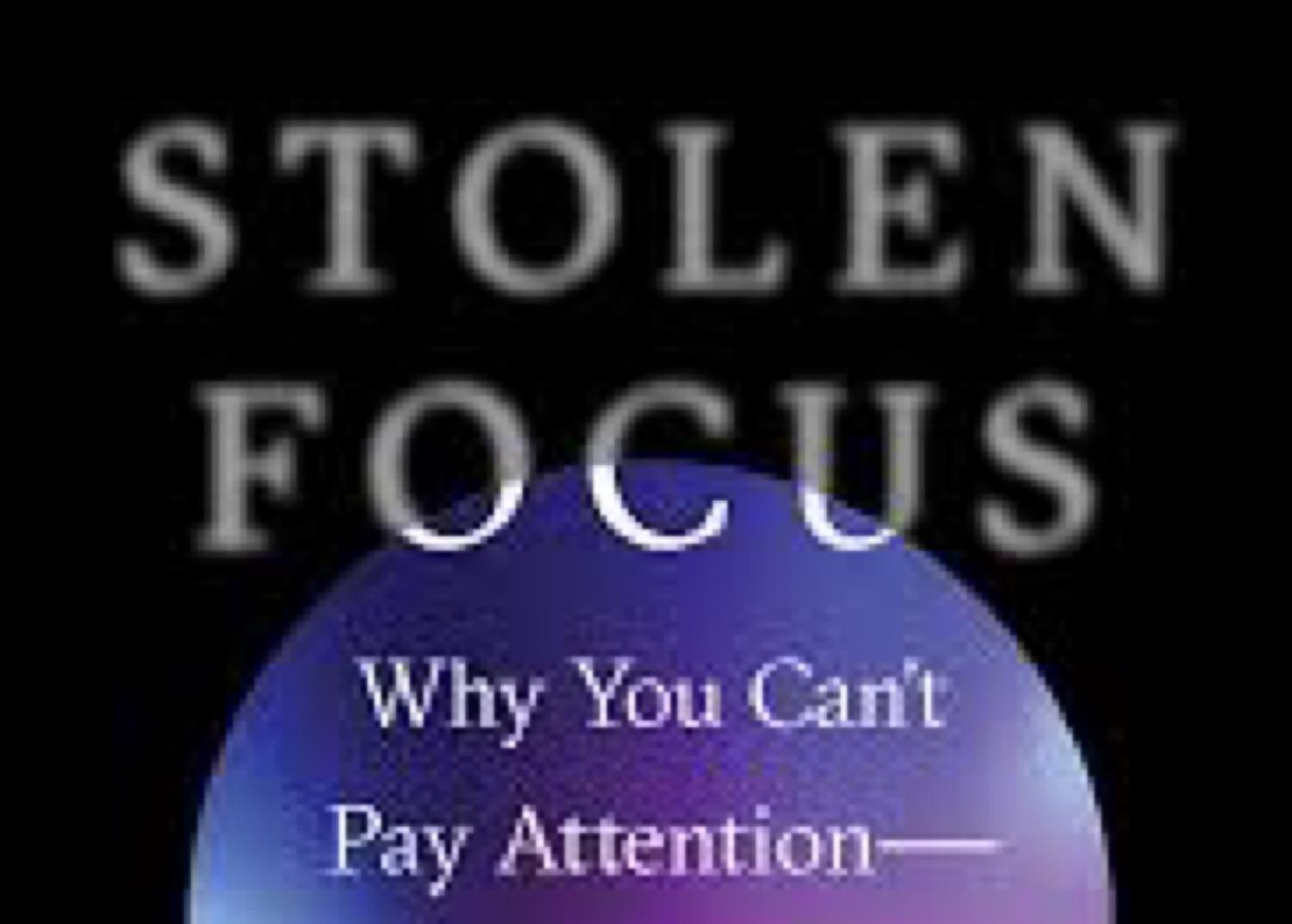Stolen Focus: Why We Can’t Pay Attention—and How We Can Think Deeply Again
Curated from: nextbigideaclub.com
Ideas, facts & insights covering these topics:
22 ideas
·56K reads
262
11
Explore the World's Best Ideas
Join today and uncover 100+ curated journeys from 50+ topics. Unlock access to our mobile app with extensive features.
Stolen Focus: Why You Can’t Pay Attention
Johann Hari is a writer and journalist. He has written for the New York Times, Le Monde, The Guardian, and other newspapers. His TED Talks have been viewed over 70 million times, and his work has been praised by a broad range of people, from Oprah Winfrey to Noam Chomsky to Joe Rogan.
Below, Johann shares key insights from his new book, Stolen Focus: Why You Can’t Pay Attention—and How to Think Deeply Again.
595
4.21K reads
We Are Living In A Focusless World
We are now living in a serious crisis of attention—one that is analogous to the obesity crisis, or the climate crisis. The average college student now spends just 65 seconds on each task. The average office worker spends just three minutes. Even the average Fortune 500 CEO only gets 28 minutes of uninterrupted focus a day.
594
4.34K reads
We Are Blaming Ourselves For Our Inability To Focus
Most of us are responding to this crisis by blaming ourselves. “You’re weak, you’re lazy, your willpower isn’t strong enough.”
Hari has spent three years traveling all over the world, interviewing over 200 leading experts on this subject. What he learned from them is that this is, in fact, a systemic crisis—one that is happening to all of us—and it requires systemic solutions.
584
3.72K reads
But Our Brain Can’t Be Normal Anymore
Professor Joel Nigg, one of the leading experts on children’s attention problems, told Hari that we need to ask if we are living in an “attentional pathogenic environment,” one in which tasks that require deep focus—like reading a book—are becoming more and more like running up a down escalator. Professor Barbara Demeneix, a French scientist, told him, “There is no way we can have a normal brain today.”
581
3.51K reads
Our Brain Has Been Hacked
Hari learned that there is scientific evidence for 12 factors that can degrade our attention—and many of those factors have been rising dramatically in the past few years. In other words, your attention didn’t collapse; it was stolen by these big and powerful forces. You haven’t become weak. You’ve been hacked. Interestingly, tech—which is normally the first cause we think of—is playing a significant role, but it isn’t the biggest of the causes. To get out of this crisis—to get our brains back—we need to first understand these 12 causes, and then deal with them one by one.
584
3.01K reads
Our Brain Is Not, By Nature, A Juggler
Professor Earl Miller, one of the leading neuroscientists at the Massachusetts Institute of Technology (MIT), told Hari bluntly: “Your brain can only produce one or two thoughts” in your conscious mind at once. That’s it. “We’re very, very single-minded.” Yet the average young person now believes they can follow six or seven forms of media at the same time.
601
3K reads
So It Acts Like A Switcher
When neuroscientists studied this simultaneous multiple following they found that when people believe they are doing several things at once, they are actually—as Miller explained—“juggling. They’re switching back and forth. They don’t notice the switching because their brain sort of papers it over, to give a seamless experience of consciousness. But what they’re actually doing is switching and reconfiguring their brain moment-to-moment, task-to-task—[and] that comes with a cost.”
588
2.87K reads
First, It Does The Tape Stop Effect
When your brain is switching back and forth “your performance drops, you’re slower—all as a result of the switching.” It feels like a small effect, but it degrades your attention and thinking by a startling amount. One study at Carnegie Mellon University’s Human Computer Interaction Lab took 136 students and got them to take a test. Some of them had to have their phones switched off, and others had their phones on and received intermittent text messages. The students who received messages performed, on average, 20% worse. Other studies in similar scenarios have found even worse outcomes of 30%
584
2.54K reads
And Then It Hits Rewind
But it gets worse still. Professor Michael Posner at the University of Oregon found that if you are interrupted, it takes you an average of 23 minutes to get back to the same level of focus you had before you were disturbed. So if your screen time shows that you spend three hours a day on your phone, you are losing much more. Yet we are surrounded by apps like Facebook that are designed to interrupt you and get you to pick up your device and start scrolling.
602
2.3K reads
The Psychology Behind Struggling To Focus: (Hyper)Vigilance
Imagine that, one day, you are attacked by a bear, and you survive. In the weeks and months that follow, your attention will shift, involuntarily, from focusing on the things in front of you—say, your emails—to scanning for dangers all around you. You will find it harder to focus on more everyday concerns because you are primed to spot unexpected threats. Now imagine that, just as you start to feel safe, you are attacked by a bear again. You will then flip into a state called “hypervigilance,” where you are constantly scanning for risks, and find it impossible to focus.
595
2.24K reads
The Greater The Vigilance, The Lesser The Focus
But this phenomenon isn’t limited to bear attacks; any stressful situation will trigger greater vigilance. This is why stress—at work or at home—so often causes a huge increase in attention problems. As Dr. Jon Jureidini, a leading child psychiatrist in Adelaide, Australia, told Hari, narrowing your focus is “a really good strategy in a safe environment, because it means you can learn things and flourish and develop.”
606
2.16K reads
So, What Deep Focus Really Requires Is Safety
“But if you are in a dangerous environment, selective attention [where you focus on just one thing] is a really dumb strategy. What you need instead is to evenly spread vigilance around your environment, looking for cues for danger.” In short, deep focus is something you can only really do when you have achieved safety. So, nobody should blame themselves for struggling to focus during a pandemic.
597
2.18K reads
The Biology Behind Struggling To Focus: (Hyper)Processed Diet
A new field of science has emerged in the past few years called “nutritional psychiatry”—the study of how what we eat affects how our brain works. By interviewing some of the leading figures in this field, Hari learned that the unprecedented shift in the Western world toward eating mostly processed foods has seriously affected our ability to focus, in three ways.
580
2.04K reads
Ways Processed Diet Affects Focus - Energy Spikes And Crashes
The first, as one of Britain’s leading nutritionists, Dr. Dale Pinnock, explained to Hari, is that our diet causes huge energy spikes, and then energy crashes—which leave us with brain fog. Imagine, for instance, that you eat white bread or Frosties for breakfast; that releases glucose really fast, giving you a rush of energy. But then your blood sugar crashes, and you slump at your desk, feeling drained and unable to think clearly. It is, Pinnock said, “like putting rocket fuel into a Mini. It would just burn out and bust very quickly—because it can’t handle that.
589
1.84K reads
Ways Processed Diet Affects Focus - Lack Of Nutrients
Secondly, our current diet deprives us of key nutrients that are necessary for our brains to fully develop and grow. A Dutch study assigned children to a diet where they had to cut out most of the synthetic, processed foods we normally eat. 70% of them experienced an increase in attention—and the average improvement was of 50%.
582
1.8K reads
Ways Processed Diet Affects Focus - Abundance Of Additives
Thirdly, our current diet contains dyes and chemicals that act on our brains like drugs, amping us up. A study in Southampton in Britain took a group of kids and divided them in two. One was given a plain drink, and the other was given a cocktail of dyes and other chemicals that are found in the candies kids eat every day. The kids given the cocktail were significantly more likely to become wild. We already knew the Western diet was making us obese, but it is also ruining our focus.
566
1.59K reads
How We Can Respond As Individuals
There are two levels at which we need to respond to this crisis. The first is as isolated individuals, by making changes in our own lives and our children’s lives, to protect ourselves from the forces invading our attention. Hari learned many different techniques, which he goes through in the book. To name just one that really helped him: he bought a K-Safe, a small plastic safe that will lock away your smartphone for however long you tell it to. So he imprisons his phone and gets x hours of undisturbed time every day.
578
1.68K reads
How We Can Respond As A Society
Individual changes will help, but they will only get us so far. At the moment, it is as though we are all being covered with itching powder, and the person pouring the itching powder on us is saying, “You know, you might want to learn to meditate. Then you wouldn’t scratch so much.” Meditation does have value, but we need to band together and collectively take on the forces pouring this powder on us, and stop them.
563
1.63K reads
Who’s Pouring The Itching Powder?
Hari names, unsurprisingly, the social media.
He claims that as long as social media companies profit from interrupting and distracting us, they will find ever-more sophisticated techniques to do it. We need to force them to adopt a different business model.
568
1.68K reads
There Was Once Another Poison That Is No More
There’s a precedent, as the technologist Jaron Lanier has pointed out. In the 1970s, we learned that the lead that was found in our paint and our gasoline was damaging our children’s brains. So, we banned the lead. We still paint our homes and drive our cars—but without lead. We now need to do the same with the factors that are ruining our attention today. This requires a shift in perspective. We need to stop asking for tiny tweaks.
571
1.76K reads
“Concentrate all your thoughts upon the work at hand. The sun's rays do not burn until brought to a focus.”
ALEXANDER GRAHAM BELL
619
3.41K reads
“I did not succeed in life by intelligence. I succeeded because I have a long attention span.”
CHARLIE MUNGER
609
2.41K reads
IDEAS CURATED BY
CURATOR'S NOTE
Social media and many other facets of modern life are destroying our ability to concentrate. We need to reclaim our minds while we still can.
“
Xarikleia 's ideas are part of this journey:
Learn more about motivationandinspiration with this collection
How to prioritize self-care in the workplace
How to adapt to new work arrangements
How to maintain work-life balance
Related collections
Similar ideas
16 ideas
Stolen Focus Summary
fourminutebooks.com
15 ideas
How Minds Change: The Surprising Science of Belief, Opinion, and Persuasion
nextbigideaclub.com
19 ideas
Stolen Focus
Johann Hari
Read & Learn
20x Faster
without
deepstash
with
deepstash
with
deepstash
Personalized microlearning
—
100+ Learning Journeys
—
Access to 200,000+ ideas
—
Access to the mobile app
—
Unlimited idea saving
—
—
Unlimited history
—
—
Unlimited listening to ideas
—
—
Downloading & offline access
—
—
Supercharge your mind with one idea per day
Enter your email and spend 1 minute every day to learn something new.
I agree to receive email updates



